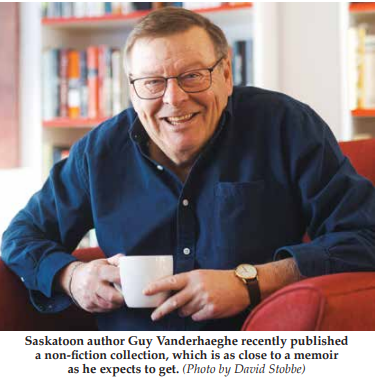

When Guy Vanderhaeghe published his first work in 1982, he made a dramatic entrance onto the literary stage. Man Descending, a collection of short stories, won the Governor General’s Award for English fiction and subsequently also took the United Kingdom’s Faber Prize. Since then, among many other awards, his historical novel The Englishman’s Boy and book Daddy Lenin and Other Stories have also won “The GG,” placing him in the company of the most-decorated authors in Canadian history. He is one of only four authors to have taken the GG English fiction award three times. (The others are Alice Munro, Hugh MacLennan and Michael Ondaatje.) No one has won it more often. He has, of course, published other works, including two plays and the most recent August Into Winter. Then in late September came the launch of Because Somebody Asked Me To: Observations on History, Literature, and the Passing Scene, published by Saskatoon’s Thistledown Press.
This time, he has compiled a collection of short non-fiction works written over many years, which raises the question: is it a memoir? “Only in retrospect,” Vanderhaeghe said in an interview. “When I started collecting the pieces I saw how there were certain parts of my life I had written about over the years, going back to 1983.”
And who is the somebody who asked you to? “In the author’s note, I talk about I had this early mentor, Morris Wolfe, who wanted to publish these non-fiction pieces that I had been writing and he had been reading over the years. “I said no to him. I thought they were inconsequential, and they weren’t the sort of thing I felt very confident about. “When he died, I was kind of stricken with guilt, that I had said no to him. In the author’s foreword, I said the book is called Because Somebody Asked Me To, because of all the people I should not have refused when they asked me, I should not have refused him. “That was the impetus to look at this stuff, put it together and pay homage to him.” Vanderhaeghe refers to the collection as a bit of a “hodgepodge,” including book reviews of the works of prominent authors; talks he has given on writing; a musing on the importance of place in literature; and a few rather hilarious stories about his own life, notably the purchase of his first home. “Somebody asked me to write a memoir about 10 years ago and I said ‘no, I’m not interested in doing that,’” he said. “I don’t think I ever would be interested in writing an extensive memoir, but I am somewhat interested in using my life as an illustration for other people, particularly young people who might want to be writers or artists.”
It was “improbable,” he said, that he would become an author, looking at his early life in Esterhazy, Sask. While his mother was “big on education,” his father was functionally illiterate. Furthermore, he had little access to the children’s classics of the time, although he read everything he could get his hands on. He also admitted to going “pretty badly off the rails” in high school, although he nonetheless ended up being the first person on either side of his family to go to university. He was working on an irrigation project in B.C. when his Grade 12 marks came in. “In 1968, all you needed was a 65 average to go to university. I leapt over that bar. I think my average was about 65.2,” he said. “The only reason I had even that kind of average was that we used to have to write provincial exams. The exams that year were so hard they distorted the bell curve. People like me who were right down at the bottom slope of the bell curve, we got this artificial boost that lifted our marks. “When my marks came in, my mother signed me up for university and then she phoned me and said, ‘you’re going to university.’ So I went.” He considered psychology, law and various other avenues, but early on he had a professor who encouraged him to study history, for which he won a scholarship. Grounded in the human past, he is now well-known for his historical works but began by writing contemporary fiction.
“When I first started writing, it was a period of Canadian cultural nationalism. I think a lot of writers felt an obligation in a sense to write their place, to be unabashedly Canadian,” he said. “Living where I did, I kind of wanted to write fiction that was set here and dealt with basically the time period in which I grew up and the time I was living. “That’s what I did for two collections of short stories and two novels. And then, I think sort of unconsciously, I kind of felt that I should also try and write the history of the place, to do that in fiction. “I sort of slowly drifted into it.
The first historical thing I did was a play, and it was a play (Dancock’s Dance) that was set in 1919 in what used to be called the Saskatchewan Hospital for the Insane (in North Battleford.)” The past felt like a comfortable place to Vanderhaeghe, but there was another motivation. “I always felt historical fiction was an oblique way of nudging people to see similarities in events —and not to put a ring in their noses and drag them to conclusions but for people to think about how we have arrived at where we are and where we may be going in the future without being too didactic about it.” Memoir or no, the author’s new book addresses these ideas, along with — for example — the great fun of having a movie made from your novel. The Englishman’s Boy became a mini-series in 2008. “It is a grab bag book. I can’t pretend that it isn’t,” Vanderhaeghe said. “But there are two obsessions that the book reflects in one way or another: what is the meaning of history, and what is the meaning of literature: do they ever coincide, and what happens when they sometimes collide.” Because Somebody Asked Me To is available at McNally Robinson, through Thistledown and online book sellers.
-Joanne Paulson

Leave a Reply